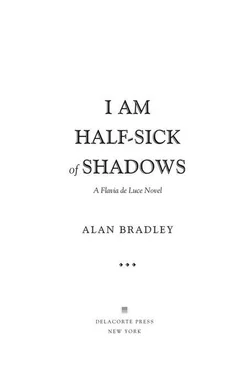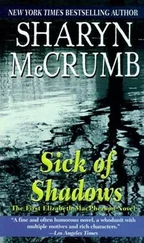Alan Bradley - I Am Half-Sick of Shadows
Здесь есть возможность читать онлайн «Alan Bradley - I Am Half-Sick of Shadows» весь текст электронной книги совершенно бесплатно (целиком полную версию без сокращений). В некоторых случаях можно слушать аудио, скачать через торрент в формате fb2 и присутствует краткое содержание. Жанр: Старинная литература, на английском языке. Описание произведения, (предисловие) а так же отзывы посетителей доступны на портале библиотеки ЛибКат.
- Название:I Am Half-Sick of Shadows
- Автор:
- Жанр:
- Год:неизвестен
- ISBN:нет данных
- Рейтинг книги:5 / 5. Голосов: 1
-
Избранное:Добавить в избранное
- Отзывы:
-
Ваша оценка:
- 100
- 1
- 2
- 3
- 4
- 5
I Am Half-Sick of Shadows: краткое содержание, описание и аннотация
Предлагаем к чтению аннотацию, описание, краткое содержание или предисловие (зависит от того, что написал сам автор книги «I Am Half-Sick of Shadows»). Если вы не нашли необходимую информацию о книге — напишите в комментариях, мы постараемся отыскать её.
I Am Half-Sick of Shadows — читать онлайн бесплатно полную книгу (весь текст) целиком
Ниже представлен текст книги, разбитый по страницам. Система сохранения места последней прочитанной страницы, позволяет с удобством читать онлайн бесплатно книгу «I Am Half-Sick of Shadows», без необходимости каждый раз заново искать на чём Вы остановились. Поставьте закладку, и сможете в любой момент перейти на страницу, на которой закончили чтение.
Интервал:
Закладка:
“As you wish,” Dogger told him, and it seemed to me there was a touch of sadness in his voice.
We descended the stairs, McNulty openly running his fingers over the carved banister ends, craning his neck to gawk at the carved paneling.
“S’truth,” he muttered under his breath.
“You’ll never guess who’s directing this film!” I said, bursting into the drawing room.
“Val Lampman,” Daffy said in a bored voice, without looking up from her book. “Phyllis Wyvern doesn’t work with anyone else nowadays. Not since—”
“Since what?”
“You’re too young to understand.”
“No, I’m not. What about Boccaccio?” Daffy had recently been reading aloud to us at tea, selected tales from Boccaccio’s Decameron .
“That’s fiction,” she said. “Val Lampman is real life.”
“Says who?” I countered.
“Says Cinema World . It was all over the front page.”
“What was?”
“Oh, for God’s sake, Flavia,” Daffy said, throwing down her book, “you grow more like a parrot every day: ‘Since what? Says who? What was?’ ”
She mimicked my voice cruelly.
“We ought to teach you to say ‘Who’s a pretty bird, then?’ or ‘Polly wants a biscuit.’ We’ve already ordered you a cage: lovely gold bars, a perch, and a water dish to splash about in—not that you’ll ever use it.”
“Sucks to you!”
“I deflect it back unto you,” Daffy said, holding out an invisible shield at arm’s length.
“And back to you again,” I said, duplicating her gesture.
“Ha! Yours is a brass shield. Brass doesn’t bounce sucks. You know that as well as I do.”
“Does!”
“Doesn’t!”
It was at this point that Feely intervened in what had been, until then, a perfectly civilized discussion.
“Speaking of parrots,” she said, “Harriet had a lovely parrot before you were born—a beautiful bird, an African Grey, called Sinbad. I remember him perfectly well. He could conjugate the Latin verb ‘amare’ and sing parts of ‘The Lorelei.’ ”
“You’re making this up,” I told her.
“Remember Sinbad, Daffy?” Feely said, laughing.
“ ‘The boy stood on the burning deck,’ ” Daffy said. “Poor old Sinby used to scramble up onto his perch as he squawked the words. Hilarious.”
“Then where is he now?” I demanded. “He should be still alive. Parrots can live more than a hundred years.”
“He flew away,” Daffy said, with a little hitch in her voice. “Harriet had spread a blanket on the terrace, taken you out for some fresh air. Somehow you managed to work loose the catch on the door of the cage, and Sinbad flew away. Don’t you remember?”
“I didn’t!”
Feely was looking at me with eyes which were no longer those of a sister.
“Oh, but you did. She often said afterwards that she wished it had been you who had flown away, and Sinbad who had stayed.”
I could feel the pressure rising in my chest, as if I were a steam boiler.
I said a forbidden word and walked stiffly from the room, vowing revenge.
There were times when a touch of the old strychnine was just the ticket.
I would go upstairs straight away to my chemical kitchen and prepare a delicacy that would have my hateful sisters begging for mercy. Yes, that was it! I would spice their egg salad sandwiches with a couple of grains of nux vomica . It would keep them out of decent company for a week.
I was halfway up the stairs when the doorbell rang.
“Dash it all!” I said. There was nothing I hated more than being interrupted when I was about to do something gratifying with chemicals.
I trudged down from the landing and flung open the door angrily.
There, looking down his nose at me, stood a chauffeur in livery: light chocolate coat with corded trim, flared breeches tucked into tall tan leather boots, a peaked cap, and a pair of limp brown leather gloves held a little too casually in his perfectly manicured hands.
I didn’t like his attitude, and, come to think of it, he probably didn’t like mine.
“De Luce?” he asked.
I stood motionless, waiting for decency.
“Miss de Luce?”
“Yes,” I said grudgingly, peering round his body as if there might be others like him hiding in the bushes.
The pantechnicon and vans had gone from the forecourt. A maze of snowy tracks told me that they had been moved round to the back of the house. In their place, idling silently in little gusts of snow, was a black Daimler limousine, polished, like a funeral coach, to an unearthly shine.
“Come in and close the door,” I said. “Father’s not awfully keen on snowdrifts in the foyer.”
“Miss Wyvern has arrived,” he announced, drawing himself to attention.
“But—” I managed, “they weren’t supposed to be here until noon …”
Phyllis Wyvern! My mind was spinning. With Father away, surely I couldn’t be expected to …
I’d seen her on the silver screen, of course, not just at the Gaumont, but also at the little backstreet cinema in Hinley. And once, also, when the vicar had hired Mr. Mitchell, who operated Bishop’s Lacey’s photo studio, to run The Rector’s Wife in St. Tancred’s parish hall, hoping, I suppose, that the story would arouse a feeling of sympathy in our parish bosoms for his rat-faced—and rat-hearted—wife, Cynthia.
Of course, it had no such effect. Despite the fact that the film was so old and scratched and full of splices that it sometimes made the picture leap about on the screen like a jumping jack, Phyllis Wyvern had been magnificent in the role of the brave and noble Mrs. Willington. At the end, when the lights came up, even the projectionist was in tears, although he’d seen the thing a hundred times before.
Nobody gave Cynthia Richardson a second look, though, and I had seen her afterwards, in the darkness, slinking home alone through the graveyard.
But how does one talk, face-to-face, with a goddess? What does one say?
“I’ll ring for Dogger,” I said.
“I’ll see to it, Miss Flavia,” said Dogger, already at my elbow.
I don’t know how he does it, but Dogger always appears at precisely the right instant, like one of those figures that pops out of the door on a Swiss clock.
And suddenly he was walking towards the Daimler, the chauffeur slipping and sliding in front of him, trying to be the first to take hold of the car’s door handle.
Dogger won.
“Miss Wyvern,” he said, his voice coming clearly to my ears on the cold air. “On behalf of Colonel de Luce, may I welcome you to Buckshaw? It’s a pleasure to have you with us. The Colonel has asked me to express his regrets that he is not here to greet you.”
Phyllis Wyvern took Dogger’s extended hand and stepped out of the car.
“Watch your step, miss. The footing is treacherous this morning.”
I could see her every breath distinctly on the cold air as she took Dogger’s arm and floated towards the front door. Floated! There was no other word for it. In spite of the slick walkway, Phyllis Wyvern floated towards me as if she were a ghost.
“We weren’t expecting you until noon,” Dogger was saying. “I regret that the walkways have not yet been fully shoveled and ashes put down.”
“Think nothing of it, Mr.—”
“Dogger,” Dogger said.
“Mr. Dogger, I’m just a girl from Golders Green. I’ve managed in snow before and, I expect I shall manage again.
“Oops!” She giggled, pretending to slip and smiling up at him as she clung to his arm.
I couldn’t believe how tiny she was, her head barely level with his chest.
She wore a tight-fitting black suit with a white blouse with a black and yellow Liberty scarf, and, despite the grayness of the day, her complexion was like cream in a summer kitchen.
Читать дальшеИнтервал:
Закладка:
Похожие книги на «I Am Half-Sick of Shadows»
Представляем Вашему вниманию похожие книги на «I Am Half-Sick of Shadows» списком для выбора. Мы отобрали схожую по названию и смыслу литературу в надежде предоставить читателям больше вариантов отыскать новые, интересные, ещё непрочитанные произведения.
Обсуждение, отзывы о книге «I Am Half-Sick of Shadows» и просто собственные мнения читателей. Оставьте ваши комментарии, напишите, что Вы думаете о произведении, его смысле или главных героях. Укажите что конкретно понравилось, а что нет, и почему Вы так считаете.











